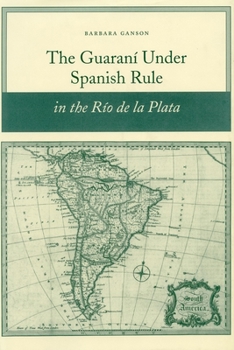The Guaraní Under Spanish Rule in the Río de la Plata
This ethnographic study is a revisionist view of the most significant and widely known mission system in Latin America--that of the Jesuit missions to the Guaran Indians, who inhabited the border regions of Paraguay, Argentina, and Brazil. It traces in detail the process of Indian adaptation to Spanish colonialism from the sixteenth through the early nineteenth centuries.
The book demonstrates conclusively that the Guaran were as instrumental in determining their destinies as were the Catholic Church and Spanish bureaucrats. They were neither passive victims of Spanish colonialism nor innocent "children" of the jungle, but important actors who shaped fundamentally the history of the R o de la Plata region. The Guaran responded to European contact according to the dynamics of their own culture, their individual interests and experiences, and the changing political, economic, and social realities of the late Bourbon period.





